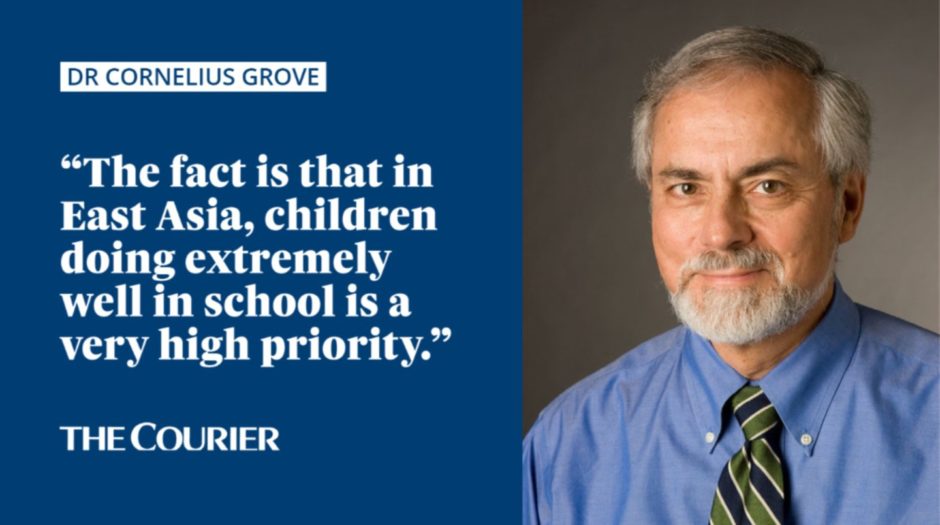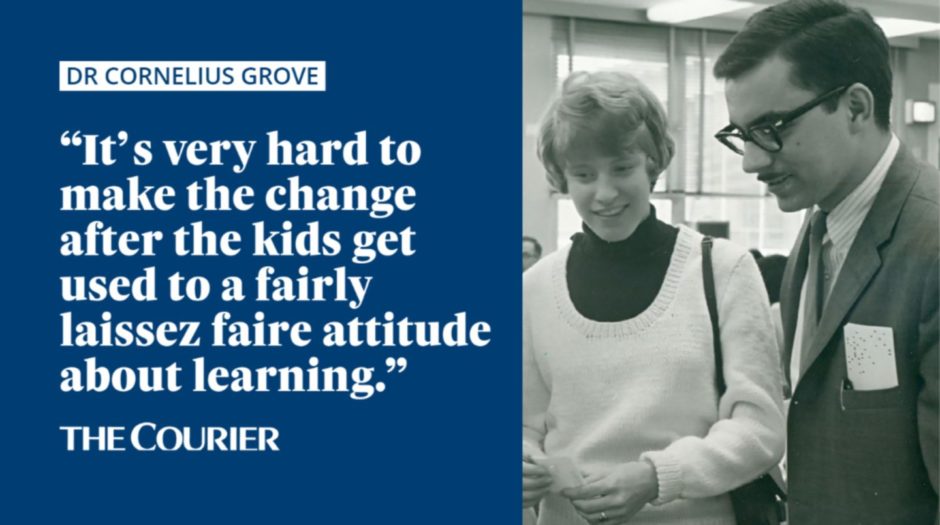Lost school time due to the pandemic has left many parents seeking ways in which to boost their child’s learning. As part of our Parent Hub: Supporting Your Child’s Learning series, we bring you top tips from the experts – and they don’t all agree, highlighting there are as many different opinions in education, as there are in parenting.
Learning is ‘not about fun’ says an American education expert, who has spent years investigating why East Asian students repeatedly come out top in international tests.
Dr Cornelius Grove, an interculturalist and educator, says how seriously East Asian parents take their children’s education is what gives them the edge over Westerners.
He insists it would be impossible for Western culture to replicate.
But one thing parents here can do, is take inspiration from East Asian family values and show their children how seriously they take their education, he says.

Dr Grove said: “It’s not about fun to East Asians – it’s about an important life task.
“Does that sound a little bit grim? Well to us fun-loving people it does but to them it’s very important.”
He added: “The fact is that in East Asia, children doing extremely well in school is a very high priority.
“In fact for families, and obviously for teachers, it’s one of the most important things, if not the most important – they take this very seriously.”
Dr Grove, who received a Doctorate from Columbia University, USA, after studying how children transition from one culture to another in the classroom, says this paints a stark contrast with Western cultures.
Western families generally believe in their children being ‘well-rounded’, that is, doing well in school while also excelling in extra-curricular activates.
He said: “This is not what you hear in East Asia.
“Many families have no interest in promoting their children to join a team, I’m sure you could find families that do but we’re dealing in very broad generalisations.”
The communitarian, or group-minded, approach
Another major difference, according to Dr Grove, is the communitarian values of East Asian families.
He claims they play a key role in the behaviour of children, saying: “They’re not trying to work on their own identity or their own way in life, they are part of a family.
“So when a student does well in school, it’s not just that it’s very good for the student, clap them on the back, it’s the family gaining prestige.”
An involved approach to studying
Having spent several years with East Asian families, mostly in China and Japan, Dr Grove says the family usually takes an involved approach to support their children with school work.
He said: “A place is made for them to study, people keep quiet, their mother brings them tea, all sorts of things to emphasise that.
“There’s many accounts on record where the mother will get a copy of the very same text book and follow the textbook as her child is studying it.”
Dr Grove, who lives in Brooklyn, New York, has written two books based on his studies – The Drive to Learn and A Mirror for Americans.
His research looks into all types of social groups, spanning a range of families with varied incomes and privileges in order to understand culture generally.
Differences in education system
There are fundamental differences in our education systems, he says.
Dr Grove said: “East Asian schoolchildren are taught how to be in a classroom, what behaviours to adopt, how to listen, how to organise their desk, how to arrange their books.
“By how to listen, I mean how to sit, how to face the front, how to have their hands on their legs, except if they’re taking notes.
“If the teacher says ‘come to the front of the room and use the blackboard to explain your answer to this question’, how do they do that.”
Another key difference is in education textbooks, he says.
Dr Grove said: “They are much thinner than ours, less pictures, no talking about how to apply knowledge to possible career, no stories to make the work more palatable or fun.
“East Asian textbooks are usually black and white and they just focus on the knowledge to be learned.
“No photos, no fun stuff, nothing to jazz it up or make it interesting for the students, it’s just the knowledge.”
‘It’s not about making it fun’
In Western cultures school is often viewed as a place to build character, resilience, social skills and enjoy childhood, while learning at the same time.
Lessons are planned to be engaging for youngsters and many educational psychologists here believe making learning fun is crucial to children’s success in learning.

And pressure is mounting on the Scottish Government to enhance the approach by delaying our school starting age and introducing a kindergarten stage focused on learning through play.
Campaign groups such as Upstart Scotland and Give Them Time believe this would allow children to develop before focusing on formal education, however opinions amongst parents are mixed.
Dr Grove disagrees and says ‘we get what we ask for’ – while our children are busy having a ‘real fun childhood’ their learning is just ‘getting there’.
He said: “I predict that eventually people will decide that’s not such a great idea – extreme progressivism.
“If you really think it’s important for children to learn, academically, language, maths, history, then you’ve got to show that’s important.
“And you don’t let kids this tall (gestures) decide what’s going to go on in classrooms.
“I don’t get it. It’s driven by what I would consider to be a value system that’s extremely individualistic.”
What can we learn from East Asian culture and values?
It is widely recognised that picking one or two aspects from other cultures and implementing them elsewhere does not have the desired effect, as there simply is not the culture to support it.
However Dr Grove says the ‘good news’ is that differences can be made on an individual family level, and that it is ‘never too late’ for parents start.
He said: “Better when the kids are very young though, it’s very hard to make the change after the kids get used to a fairly laissez faire attitude about learning.
“But if you start when they’re really young, showing them in a whole different way that this is really important for you and their extended family, then I think there’s a chance that a difference could be made.”
*
Next, Highlands-based educational psychologist James McTaggart shares his opposing views, in Part 2 of our Parent Hub: Supporting Your Child’s Learning series.
His take is that parents keen to boost their children’s education should not have to face a learning vs fun choice.










